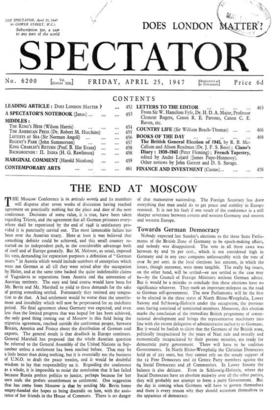Towards German Democracy
Nobody expected last Sunday's elections to the three State Parlia- ments of the British Zone of Germany to be epoch-making affairs, and nobody was disappointed. The vote in all three cases was between 65 and 7o per cent., which is not considered high in Germany and in any case compares unfavourably with the vote of over 8o per cent. in the local elections last autumn, in which the issues, though narrower, were more tangible. The really big issues, on the other hand, will be settled—or not settled as the case may be—by the Council of Foreign Ministers without German advice. But it would be a mistake to conclude that these elections have no significance whatever. They mark an important milepost on the road to German self-government. The new Parliaments will be the first to be elected in the three states of North Rhine-Westphalia, Lower Saxony and Schleswig-Holstein under the occupation, the previous ones having consisted of nominated members. Moreover, this election marks the conclusion of the immediate British programme of consti- tutional development and brings the representative machinery into line with the recent delegation of administrative authority to Germans. But it would be foolish to claim that the Germans of the British zone, politically incapacitated by the years of Nazi rule and morally and economically incapacitated by their present miseries, are ready for democratic party government. There will have to be coalition Governments. In North Rhine-Westphalia the Christian Democrats hold 91 of 215 seats, but they cannot rely on the steady support of the 12 Free Democrats and 20 Centre Party members against the 64 Social Democrats and 28 Communists. In Lower Saxony the balance is also delicate. Even in Schleswig-Holstein, where the Social Democrats have an absolute majority over all the other parties, they will probably not attempt to form a party Government. But the day is coming when Germans will have to govern themselves and there is every reason why they should accustom themselves to the apparatus of democracy.


































